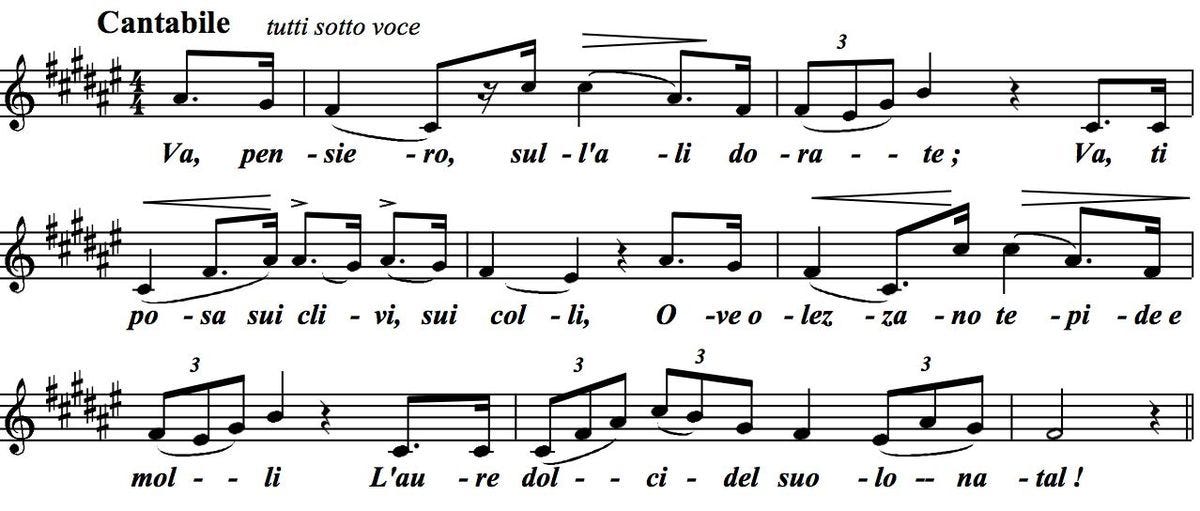Opera Daily 🎶 — "Va, pensiero" from Verdi's Nabucco
A Chorus Heard Around the World
Good morning and welcome to the weekly edition of Opera Daily, the best opera community on the internet. A reminder that you can check out the complete Opera Daily archives and the playlist on YouTube for more selections. If you were forwarded this email by a friend, join us by subscribing here:
Today we’re listening to…
"Va, pensiero" (also known as “Chorus of the Hebrew Slaves”) from Act 3 of Giuseppe Verdi’s Italian opera Nabucco. The chorus in Nabucco is a leading character and becomes an essential carrier of the plot. The composer Rossini was sitting in the audience with Verdi during a performance of Nabucco and told him, "You have composed a perfect aria for the chorus!"
Nabucco is the opera that began Verdi's career as an opera composer. “Va, pensiero” passes what is known as “the whistle test” – a tune that can be easily whistled or hummed. It is one of the opera’s most recognizable melodies and a musical anthem for the enslaved Israelites in the opera, in which they lament their situation and evoke the beauties of their homeland.
🎧 Listening Example #1 (5 minute listen): The Met Orchestra and Chorus, conducted by Yannick Nézet-Séguin, perform “Va, pensiero” from Verdi’s Nabucco in a video assembled from individual takes and shown during the April 25, 2020, The Metropolitan Opera’s At-Home Gala
In an effort to bring opera to audiences everywhere during the Met’s COVID-19 closure, the company presented a virtual At-Home Gala, featuring more than 40 artists performing in a live stream from their homes all around the world. If you want to hear more from this event, here’s another great one featuring soprano Erin Morley, who accompanied herself(!) on the piano singing “Chacun le sait” from Donizetti’s La Fille du Régiment.
🎧 Listening Example #2 (5 minute listen): The chorus of Hebrew slaves sing “Va, pensiero” (twice!) conducted by Riccardo Muti in Rome, 2011
While Verdi wasn’t particularly political, he sometimes used his music for patriotic purposes, most notably with this chorus.
Nabucco (nah-BOO-koh) premiered in Milan in 1842, and tells the story of the Jews being conquered and exiled from Israel by the Babylonian King Nabucco. Although Verdi’s Nabucco is set in ancient Babylon, many societies over the centuries have felt a deep connection to the story. The words of Va, pensiero, spoke to the longings of the Risorgimento movement for Italy to be under the control of Italians:
O mia patria, si belle e perduta
Oh my country, so beautiful and so lost
Here is the complete translation of the chorus which was inspired by Psalm 137 of the Book of Psalms from the Old Testament of the Bible. In the Eastern Churches (Orthodox and Greek Catholic), it is marked as Psalm 136:
Fly, my thoughts, on wings of gold;
go settle upon the slopes and the hills,
where, soft and mild, the sweet airs
of my native land smell fragrant!
Greet the banks of the Jordan
and Zion’s toppled towers.
Oh, my country, so lovely and so lost!
Oh memory, so dear and so dead!
Golden harp of the prophets of old,
why do you now hang silent upon the willow?
Rekindle the memories in our hearts,
and speak of times gone by!
Mindful of the fate of Solomon’s temple,
Let me cry out with sad lamentation,
or else may the Lord strengthen me
to bear these sufferings!
Want more Nabucco?
Italians continue to sing “Va, pensiero” as a political act even in the 21st century. In 2011, they sang it in the Teatro dell’Opera in Rome to protest cuts in its arts budget.
A key characteristic element of Nabucco is the absence of a tenor protagonist, whose role is filled by Nabucco, a baritone. The “Verdi Baritone” appears for the first time in Nabucco. Nabucco is the King of Babylon and was ultimately ruined by his pride. After declaring himself a god, he is driven mad until he begs forgiveness from the God of the Israelites. While there has been a lot of talk about whether Placido Domingo is a baritone or not, the role of Nabucco fits him like a glove.
“Va, pensiero” quickly became one of the most famous choruses in the repertory, so enduringly associated with Verdi that it was played at his funeral by conducted Toscanini in 1901 with thousands of people singing.
Have a question or want to share your thoughts? A favorite performance? Memory? Leave a comment!
Thank you for reading (and listening),
Michele
❤️ If you enjoyed this selection, hit the heart to like it. It helps others find Opera Daily.




When I was at the Casa Verdi in Milan in 2014, I looked upon the composer’s tomb, and imagined the funeral ceremonies preceding the burial, including Toscanini conducting Va, pensiero. I also visited the Toscanini/Horowitz tomb elsewhere in Milan.
This is one of my favourites. I did find a version recorded at the Verona Arena on 24/52015. Italy entered WW1 on 23/5/1915 & this recording had 4600 Choristers from all over Italy perform it commeroating the 100 year anniversary.
It doesnt ahve the best sound quality but more than makes up for that with the raw emotion of Italy and its WW1 history. The white war, (as it was called) was vicious and there is immense emoition in the performance. Made my neck tingle and I shed a few tears.